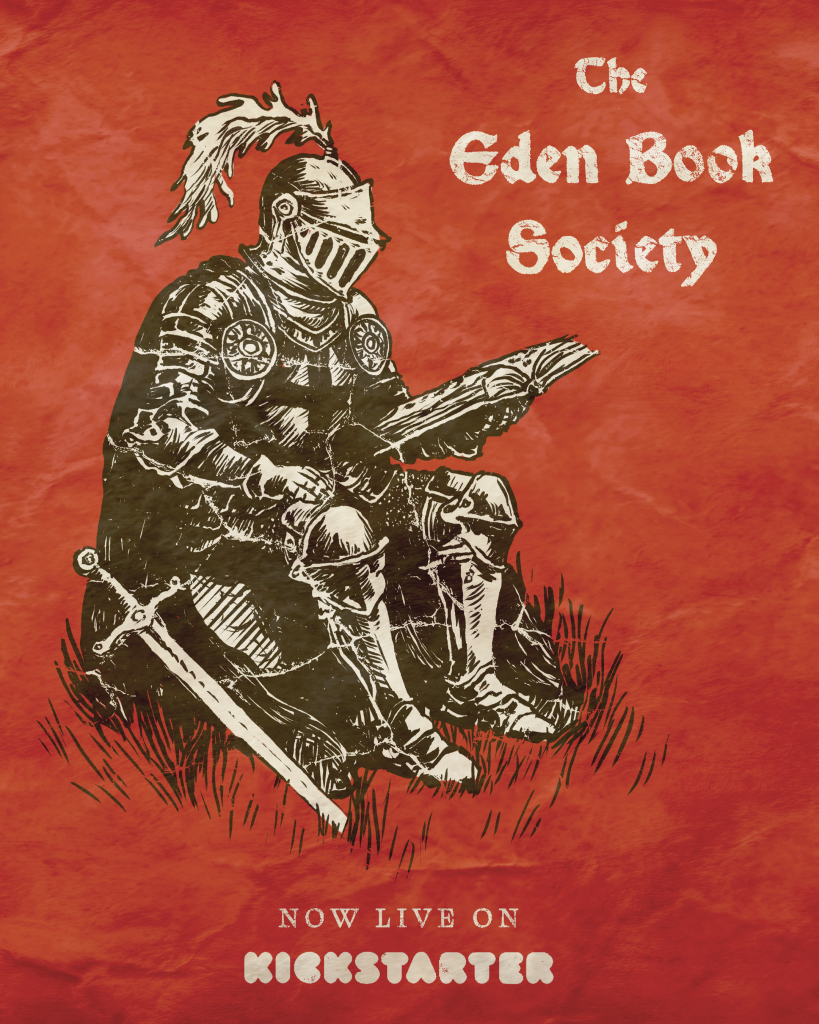The Eden Book Society is back – and I am delighted to announce my involvement with it! For more details, check out the EBS Kickstarter campaign here, where you can learn more about the Eden family, meet the Archivist, and claim your rewards.
Category: news (Page 1 of 26)
It is now just a little over two weeks before the publication of my new novel A Granite Silence. In the run-up to that, I would like to talk a little more about the background to this work – what inspired it, what it means for me as a writer. The question I have been asked a lot about this book already is: what is it? Is it historical fiction, is it true crime, are there any speculative elements involved? The simple answer is yes, yes and yes, but there’s nothing simple about this book, nor what led me to write it. A Granite Silence feels like a significant milestone for me as a writer. At the same time, it is a novel I have been gearing myself up to write for many years. Here’s an essay I wrote about that journey.
*
READING PEACE, WRITING GRANITE
‘As they left the Highbury pitch that afternoon, as the sporting men of Fulham shook their hands, slapped their backs and wished United luck, the very best of luck, Bobby had his head bowed, he did not speak, a few folk even said he looked distraught, though they could not think, not fathom why, why would he look distraught? United were in the final of the Cup, the FA bloody Cup, doesn’t get much better than that now, does it, Bobby lad? Come on, Bobby, smile, why don’t you smile? You scored a goal, you’re in the Final!’
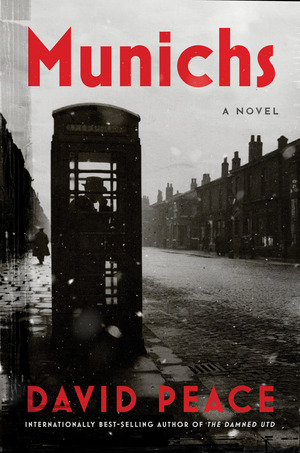
My mother remembered Munich; she was fourteen when it happened. I first learned about the crash from when she happened to mention it to me, years ago. I have forgotten exactly what she said, but I know she talked about the Busby Babes, about the tragedy of what happened to Manchester United. The odd England game aside, my mother is not a football person, never has been. But she remembered Munich.
On the afternoon of February 6th 1958, the plane carrying the team home from their European Cup fixture against Red Star Belgrade crashed at the end of the runway at Munich airport. Of the forty-four passengers on board British European Airways Flight 609, only twenty-one survived. Of the twenty-three who died, eight were Man United players. The team’s manager Matt Busby was so badly injured he took months to recover.
At the time of the Munich Air Disaster, David Peace’s father, Basil Dunford Peace was in London studying to be a teacher. He attended the match United played and won against Arsenal at Highbury the week before. He judged it the greatest game he’d ever seen. Though Basil Peace was always a Huddersfield Town supporter, it was the Babes he talked about. When his father died in 2022, David Peace set aside the book he had been working on and began to write Munichs, a novel of the crash and of its immediate aftermath, a novel about football but also – equally, tellingly – about grief.
British society after the war was slow to change. Deferential and still massively class-bound, it was a society in which the traditional hierarchies of family, church and community were strongly upheld. In Munichs, the second world war is still tangibly close. The older men – the football managers, the sports journalists – have fought in the war. Some of them have fought in two. Bobby Charlton and his friend Duncan Edwards are still doing National Service. All the young players are encouraged to learn a trade – bricklayer, builder, plumber, sparks – in case football doesn’t work out. The idea of taking their game into Europe is still very new, and they feel nervous about venturing ‘behind the Iron Curtain’. More than one of the boys who ended up on that flight would have preferred to stay at home.
Peace evokes a world in which it is still not unusual for only one house on the street to have a telephone, where families sit anxiously around the radio, waiting for news. Where women – especially working class women – are really only expected to be wives and mothers. Where young lads who’ve just been in an air crash are expected to be out on the pitch winning matches just a fortnight later.
When you look at photos of Matt Busby’s team, what hits you in the gut is just how young they were. Several of those who died were barely in their twenties. Those who survived received no trauma counselling. They were not encouraged to talk, even by their families, about what had happened to them. And once they were home there were the match-day chants, shouts that they ‘should have died at Munich’, accusations that they burn-outs, selfish for standing in the way of fresher talent. Jackie Blanchflower and John Berry, who survived the crash but who were too badly injured to continue in the game, were quickly asked to vacate their subsidised flats in order to make way for the players who would replace them.
There are intimations in Munichs of the increasingly commercial route football would follow. Even before the crash, Manchester United were sneered at for being ‘Hollywood United’, a team more interested in big names, big money and foreign travel than the home game. Matt Busby was criticized for taking the team into Europe in the first place.
In some ways, what happened at Munich represents a dividing line between the 1950s and the 1960s. The more open, socially permissive era that followed the disaster promised greater freedom and openness but less security and fewer certainties. Less emphasis on moral values, more on getting ahead. It is a harsher time, a more ruthless time, and not just in football. Is it fanciful to suggest that Munich is where Thatcherism begins? Worth remembering that Thatcher was selected as the Conservative candidate for Finchley in April 1958, just two months after Munich, that she was elected to parliament less than eighteen months after that?
There has to be something in this, at least for a writer. And for a writer the story of Munich is not all about Man United. Eight journalists as well as eight footballers were killed in the crash – a horrible symmetry – men who had known each other for longer than most of the players had been alive. In the world of sport they were famous. The funeral of Henry Rose, the most-read football columnist the Daily Express ever had, was bigger even than Duncan Edwards’s or Tommy Taylor’s. When these men died, whole lifetimes of knowledge and memory went with them, gaps that could never be filled and that marked the end of an era in British sports writing.
There is also the broader question of what caused the crash. The inquiry into the accident went on for years, undermined by disagreements and conflicts of interest between British European Airways and the German airport authorities. The pilot, James Thain, was a former RAF officer and an experienced flyer. Thain, who had just turned thirty-eight at the time of the crash, was subjected to an ongoing barrage of vitriol hurled at him by the press and by a public who were desperate for someone to blame. BEA sacked him two Christmases later, anxious to cover their backs; the German authorities were determined from the outset that Thain was at fault. It took him ten years to clear his name. He died of a heart attack not long afterwards, aged just fifty-four.
I could spend a lot of time reading and thinking about this bitter aftermath. A large part of my passion for true crime literature is in my hunger for knowledge, an obsession with the question of what really happened. Munichs though is not so much an investigation as an exhumation, an evocation of a time as viewed through the lens of a single event. The novel captures the language and texture of a grief that is both national and personal, personal not just for the fans and families of Manchester United but for Peace himself. A means of replaying his father’s memories, reimagining the effect of those headlines, that heartbreak, the abysmal sense of shock. Of bringing his father back to life, even. A way to continue with a conversation that had been cut short.
Peace’s present tense narrative rolls in a slow wave between crash survivors and the victims’ families, shellshocked staff on the ground at Old Trafford, newspaper reporters, doctors, older players coaxed back to the game by a desperate management, teenage reserves hurriedly brought on side. Hostile supporters of rival teams, keyboard warriors before their time. Taxi drivers, grieving brothers, even a monk. And of course the Dead, who haunt Peace’s account from its opening pages. Everyone has their own version of what happened at Munich. Some have more than one, hence Munichs plural, though that is not the only meaning of the novel’s title.
Peace never feels the need to use elevated language. As a potter constructs a miracle from humble red clay, so Peace achieves poetry through paying attention to the sound and rhythm of ordinary words. The language heard on the street or down the pub. Of tabloid headlines, the cliches of condolence, the gulf that exists between what is spoken and what is felt. You hear this novel as you read it: the voices of the regions, the heft and weight of sentences, the way words work harder and divulge more secrets when they are put together in a particular way.
Munichs is as much a piece of music as it is a novel, a battery of half-rhymes and assonance achieved through Peace’s habitual, repeated process of reading aloud. A symphony of sorrowful songs, a hymn to all of the Dead, including his dad.
*
I kept reading around David Peace before I actually read him. I remember seeing him on the 2003 Granta list and feeling drawn to what he was saying about how fact works in fiction. About how his first books had been inspired by the years-long, error-strewn hunt for the Yorkshire Ripper. I have always been interested in true crime for its detailed evocations of particular memories, of particular times and places. I remember also the feelings of guilt and uncertainty I used to have around reading it. True crime was sensationalist and exploitative, the stuff of tabloid newspapers. It was OK to read Crime and Punishment and talk about how it was really a crime novel but reading about real murders was somehow taboo. At least if you were serious, at least if you had taste.
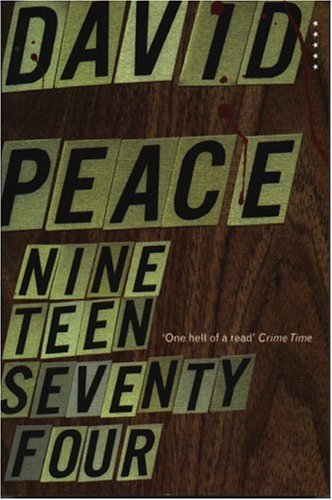
Then I read an interview with Peace that upended my thinking and ultimately changed my direction as a writer. Speaking in 2010, Peace described the crime genre as ‘the perfect tool to understand why crimes take place, and thus tell us about the society we live in and the country we live in and who we are.’ I had heard similar arguments before, but Peace went further, saying that he was ‘drawn to when writers take on history, take on real crimes. There’s just so much that happens in real life that we don’t understand, that we can’t even fathom. I don’t really see the point of making up crimes.’
I remember feeling electrified when I read that. Peace was writing densely textured works that embodied the vision and freedom to experiment that fiction offers, but that were tied to experiential reality in a way that made them even more powerful. I felt energized and inspired. I was beginning to think in a new way about what I wanted to write. At the same time I felt deeply uncertain about whether I was truly capable of this kind of writing. Whether I could bring anything new to the table. Whether I could do justice to my subject matter.
Neither could I help noticing that the field of work I was becoming interested in was dominated by men. Macho, in-your-face men like Norman Mailer and Peace’s own literary idol James Ellroy. James Ellroy is about as far from British self-deprecation as you’re going to get. But he has the goods to back up his words and in the end that’s all I care about, the quality of the writing. If Ellroy feels OK comparing himself with Beethoven then good on him, because he’s not far wrong. I wish I had his nerve.
I have since come to realise that my uncertainty had less to do with not being Norman Mailer than with not being ready. I didn’t feel I had the technical ability and I was probably right. I took the slow way round, feeling my way towards stories that made sense for me to tell, pushing the envelope of my abilities with each new thing I tried. When I finally came to write A Granite Silence it still felt like a risk, the most difficult and challenging project I had yet attempted. But I had come to a point where I sensed I might be capable of solving the problems the book presented, and where the writing itself – the words on the page – stood a chance of reaching a standard I felt I could live with.
I had arrived at the moment where the risk felt not just possible, but necessary.
*
In the autumn of 2021 I travelled to Liverpool to meet up with a friend I hadn’t seen in person since before the first lockdown. Just being in the city put me on a high. Rain fell heavily the night before I headed home again, and when I went to catch my train I discovered that the West Coast Main Line was partially flooded, that all services heading north were severely delayed. I was told to take a train to Preston and await further instructions.
“What happens when I get to Preston?” I asked. No one could tell me, because nobody knew. When I got there the scenes I encountered were predictably insane. Trains arriving and disgorging hundreds of passengers with nowhere to go. People sweeping in tides from platform to platform as rumours of trains that might get us into Scotland flared up, spread like wildfire and then guttered out. The one that finally arrived had limped all the way from Plymouth. By the time it turned up in Preston it was three hours late. I crammed myself into a luggage stand, fenced in by people’s knees and a couple of bikes. As we crossed the border at Berwick-on-Tweed an announcement crackled through the overhead speakers that all passengers were now obliged to put on their masks. The woman sitting next to me – I’d managed to grab a seat just after Newcastle – asked me if I’d managed to catch what they were saying. She’d been on the train since Birmingham. I reluctantly broke the news.
“Jesus!” she groaned. I told her if she didn’t feel like complying with Scottish law that was fine by me. We’d all been breathing each other’s air for several hours in any case. I was exhausted. I was increasingly pessimistic about making the last ferry. But what I remember most about that journey is reading David Peace’s 1980 and 1983, in a breathless six hours of immersion that were still ongoing. And how strange it was, that I was passing through the places I was reading about: those hard-nosed northern moorlands and back-to-backs, streaming past beyond the windows in a reel of silent film.
*
From the Redbeck car park back into Castleford –
Silence in the black of the back of the van –
Dim lights down black back roads –
Sat in the back of the black of the van –
Yorkshire, 1972:
You’ll wake up some morning as unhappy as you’ve ever been before.
When David Peace started work on 1974 he did so with the youthful ambition to write the best crime novel ever written. That the Red Riding novels have become classics proves the strength of that ambition, though Peace now feels ambivalent about the first movement of his quartet. Perhaps he feels that it does not stray far enough from the roots of the genre. But whilst it is true that some of those roots are showing – Derek Raymond, Ted Lewis – how could it be otherwise? When you first start writing you’re lucky, not to mention talented, if anything you produce is entirely yours. Peace had written earlier, unpublished novels before finding his true direction, grounding the story he wanted to tell in the Yorkshire of the seventies and early eighties, a time that coincided with the beginnings of his desire to write and that in some sense formed it.
He brought to it also some of the kitchen-sink sensibility of the previous generation of northern writers, whose novels he had been introduced to through his father’s book collection: Stan Barstow, who lived just a few streets away from Peace in his hometown of Ossett; Alan Sillitoe, who as well as being a novelist was also a poet. And there was something else too, something extra: the gritty, poetic rigour that marks Peace’s own style, a confidence around his material that increases as the sequence moves forward.
The material by itself is challenging enough. Peace’s portrait of a corrupt and increasingly beleaguered police force offers none of the familiarity and consolation of traditional detective fiction, and few writers have come anywhere close to confronting the traumatic effects of violence and poverty as Peace has done. In terms of story, the Red Riding novels are masterpieces of ambiguity. But what makes these books truly groundbreaking is their insistence on being more than a story, on being words on a page. Peace’s language becomes increasingly codified, more condensed, so close to poetry in places there is really no difference. The language of 1983 especially gains a kind of transcendence, hammering the page like rain on windows, staining the paper like mould.
You can feel it being written.
*
I first read TS Eliot’s The Waste Land in English class when I was fourteen. I count myself as lucky. I would bet the farm – if I had one – that they don’t teach Eliot now. My mother has always loved poetry. She used to read it aloud to me throughout my early childhood, and so I had the advantage of being familiar with how poetry works. I think even at fourteen I knew instinctively how to read The Waste Land, which I recognized as a country of the imagination as much as a symbolic portrait of the postwar landscape.
I was so excited by what I read it made my heart race. I felt angry and frustrated with my classmates, who did not get it, who kept flipping back and forth between the text and the notes at the end, trying to discover the poem’s ‘meaning’ from references they had no hope of understanding. I didn’t understand the notes either – they were too esoteric, notes from a bygone era even then – but I knew enough to know that I didn’t need them. There was something happening between me and the words, and that was enough. I was discovering phrases and cadences and – more even than that – a way of looking at language that was to become the central strand of my writer’s DNA.
To Carthage then I came
Burning burning burning burning
There was something about Eliot’s images that made my teeth chatter. Over in my German class I was coming to know the stories of Wolfgang Borchert, who had worked with similar raw material, even though his register of language and lexicon of references are very different. I began to understand how one work of literature could inform another. Storming through Red Riding forty years later I became convinced that Peace must have experienced a similar epiphany. That mental thrill, which is also visceral. The narrowing of the gap between the thought and the word.
As an adolescent, Peace harboured a secret fear that his father might be the Yorkshire Ripper, that his mother might be the Ripper’s next victim. What is any writing but the stuff you are most interested in or obsessed by? Ideas you keep having. Stories you keep noticing. Ambitions that won’t keep quiet or go away.
Finding a path towards your material can be a tortuous process. I had ambitions to write a novel based around true events for most of ten years before I found myself at work on A Granite Silence. It happened almost without my realizing it – as I describe in the novel itself, the story I had set out to write was very different. Allowing aspects of that story to keep resurfacing became essential to the narrative as it developed.
Every novel is a set of problems waiting to be solved. Paying attention to how other writers have solved their problems may not help you solve your own – the problems you have will be different, or should be – but it should at least hold out the hope that a solution is possible. David Peace’s work continues to speak to me directly. The chord it first struck was so powerful it has never died away.
Today I waved goodbye to Chris’s literary archive – thirty-two boxes of manuscripts, correspondence, photographs and notebooks covering the whole of his life and career – as they began their journey from our home on Bute to their new one at the British Library. The archive will in due course be open to readers, researchers, scholars and fans. Chris knew this was the plan, and I know he would be delighted to see that plan fulfilled. He would have been delighted also by the great care that has been taken by the archivists at the BL who have been dealing with the acquisition. Their sensitivity, expertise and appreciation have been extraordinary, and a great comfort. It is wonderful to know that Chris’s papers are in such safe hands.

Chris knew there would be a memorial for him at the Glasgow Worldcon and I know he would have been delighted and touched to see so many people gathered together to celebrate his life and writing. The event was everything I hoped it would be, and I want to offer my heartfelt thanks to everyone who came along. Thanks especially to Meg MacDonald, who was such a support to me in the run-up and who made sure everything happened, basically. How she managed to fit this in alongside everything else she had to do will remain forever a mystery, but the event would not have been the thing it was without her commitment, understanding and energy.
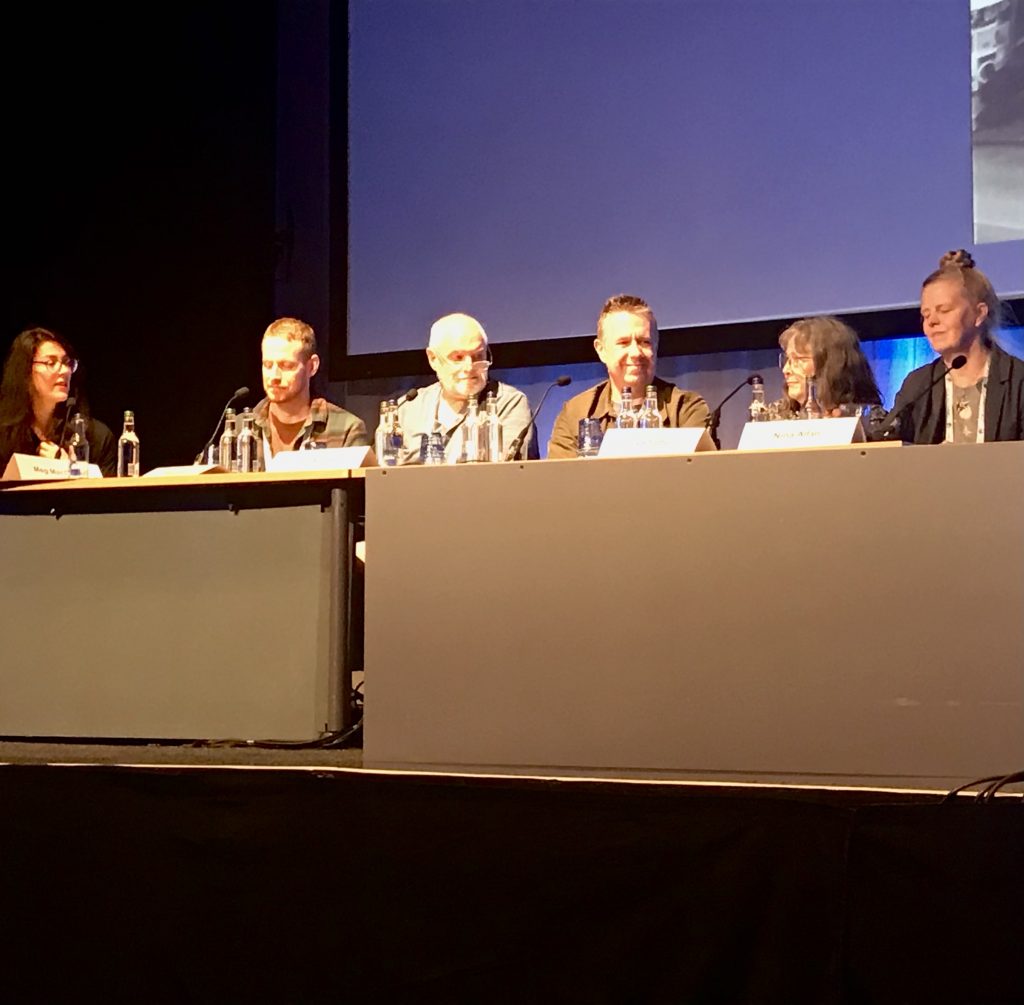
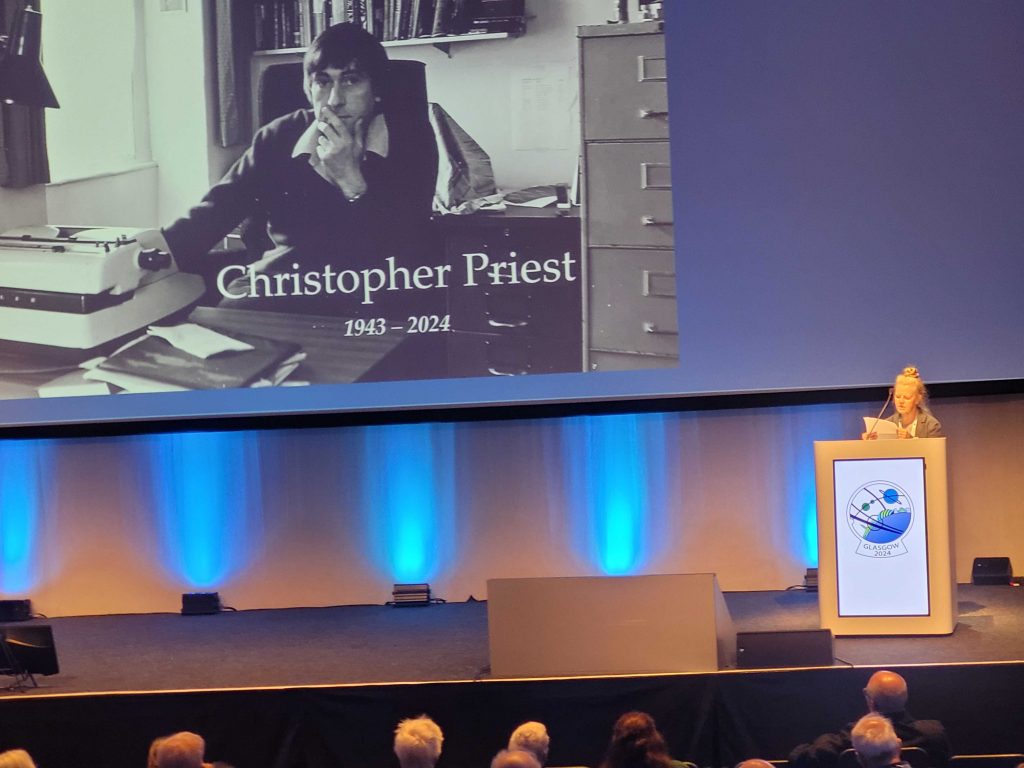
Today would have been Chris’s eighty-first birthday. How I wish he were here to see it.
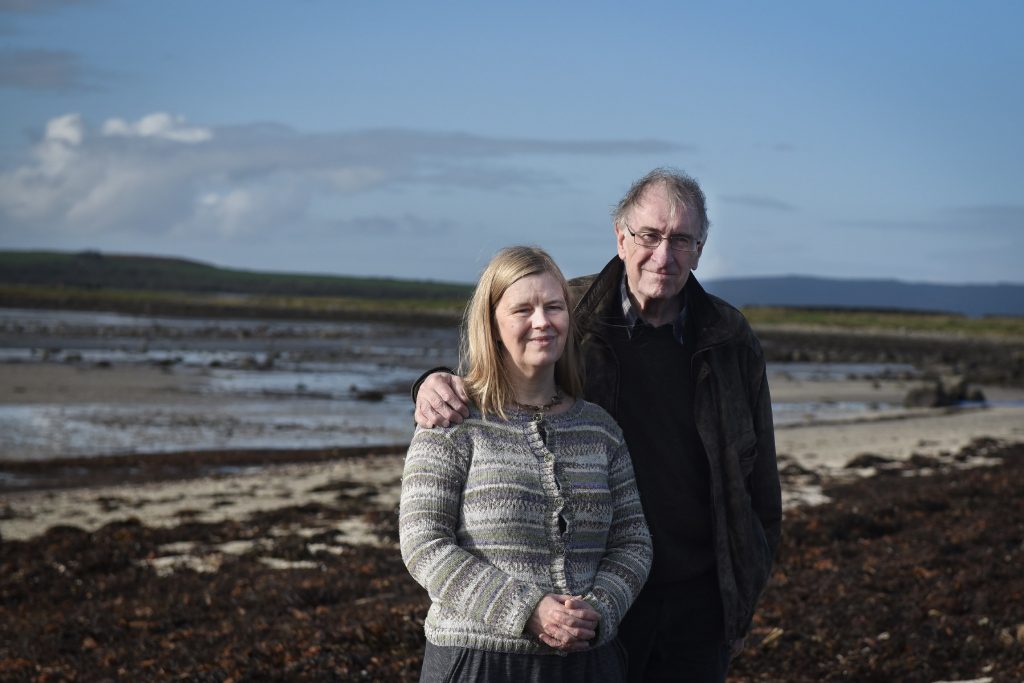
It is a perfect July morning here on Bute, the hills reflected in the waters of the firth, truer likenesses of themselves than you might see on more unsettled days. Reading Sarah Gristwood’s piece in the Guardian about her recent bereavement – her husband the film critic Derek Malcolm died last year – I find much that resonates. Like Gristwood, reading the words of other writers who have been here before me has been both incredibly helpful and strangely reassuring.
I find it difficult to say the word ‘widow’; the photograph above still feels truer to me than most things about the current situation. I have been luckier though than many of the writers Gristwood talks about in that work – writing – has been an unerring support to me. Some of you may know that Chris had been working on a biography of JG Ballard, a project he had very much hoped to complete but sadly did not. It was agreed between us before Chris died that I would finish the book, an undertaking we very much saw as our way of continuing to be together.
As the practical tasks that follow in the wake of a death are gradually completed, so I have been able to transfer more of my time and energy to working on the book. At times this still feels surreal but for the most part it is energising, life-giving. I know Chris would be pleased with how it is going.
Reading also continues to be a constant. At the moment I am finding great pleasure in rereading Patricia Highsmith’s The Talented Mr Ripley, a novel I discovered with wonder and joy in my late twenties, the first Highsmith I read. On rereading it is if anything even better – darker and more Machiavellian. I am certainly finding it less funny this time around!
To coincide with rereading the book, I am finally catching up with Steven Zaillian’s TV adaptation on Netflix, and what a thing of terrible beauty it is. I love the 1999 Minghella adaptation – Chris always said it was too long, but it’s in my Top 25 films of all time for sure – but Zaillian’s vision keeps more of the novel’s cruelty, its sense of unease. If anything, Minghella’s film is too beautiful, too – dare I say it – joyous? Maybe I’m placing too much emphasis on that incredible jazz sequence with Guy Barker but whenever I think of the Minghella film, in spite of the horrible things that happen in it I feel bathed in the endless sunshine of Positano. The black-and-white cinematography of the Zaillian adaptation is equally masterful but it lends to everything it touches – intentionally – a sense of the end-times, of dissolution. Andrew Scott is a more sinister, more morally bankrupt Ripley than Matt Damon, whose portrayal I love, I think, precisely because it allows me an emotional insight into the character. There’s no coming to terms with Scott’s Ripley; he is cold, selfish, opaque – exactly as Highsmith intended.
The Talented Mr Ripley happened to be the last of Highsmith’s novels Chris read. ‘How is this so good!’ he kept exclaiming. He had been looking forward to the new series. I think it would have gone down very well.
Today I finished checking the proofs of my next novel, A Granite Silence, which will be published next spring. The book reads well, I think. It feels ready to go.
The months since Chris’s death have been overwhelmingly busy but I am making progress with work, which still is the thing that feels most normal for me to be doing, as well as the most sustaining. I will be speaking more about my current project in due course.
I am also looking further ahead, trying to figure out exactly where I am with my work right now, what kind of writer – more difficult, at the moment, than it sounds. As always when I’m asking myself these kinds of questions I turn to other writers for insight and inspiration. At the moment I am reading John Banville’s The Book of Evidence as a kind of corollary to Mark O’Connell’s very excellent A Thread of Violence, which I read last year. O’Connell’s book is a true account of the life and crimes of Malcolm MacArthur, a ne’er do well aristocrat who committed two apparently random and senseless murders in 1982. Banville’s 1989 novel, inspired by these events, takes us deep inside the mind of a gifted man whose fatal capacity for self-delusion brings about his downfall.
I first read Banville when he won the Booker – I loved that thing he said about it being good to see a work of art winning the Booker Prize! Since then I’ve read more than half of everything he’s written and it’s always a relief, to spend time with someone who seems incapable of writing a bad sentence. What I’m paying particular attention to in The Book of Evidence is the relationship between fiction and fact. What is Banville’s relationship to this story? What is in it for him?
Other recent reads of note include Jenny Erpenbeck’s Kairos, which I was delighted to see win the International Booker and that felt to me almost like a chapter of my own life. This was not a comfortable feeling, a fact which made me appreciate the novel all the more. I also loved Ia Genberg’s The Details, and Anne Enright’s The Wren, The Wren, luminous and profound and so well written. The way Enright is able to make convincing use of modern idioms and still write like an old master is deeply impressive. The poems, too, are small miracles.
Last week I spent a few days in the Lake District with my very dear friends the writers Helen Marshall and Malcolm Devlin and their little son Davey. We had some wonderful conversations, and they were wonderful to me. I was also deeply moved to visit Dove Cottage for the first time, to look out across the same view that would have been familiar and beloved to William and Dorothy Wordsworth, two hundred years ago. One of the TV programmes Chris and I most enjoyed watching last year was the Wordsworth and Coleridge Road Trip on Sky Arts, in which Frank Skinner and Denise Mina explore the turbulent relationship between the two poets, whilst visiting the locations in which they lived and which inspired their writing. Dove Cottage was one. I know Chris would have loved being there. He would have thought it was fantastic.
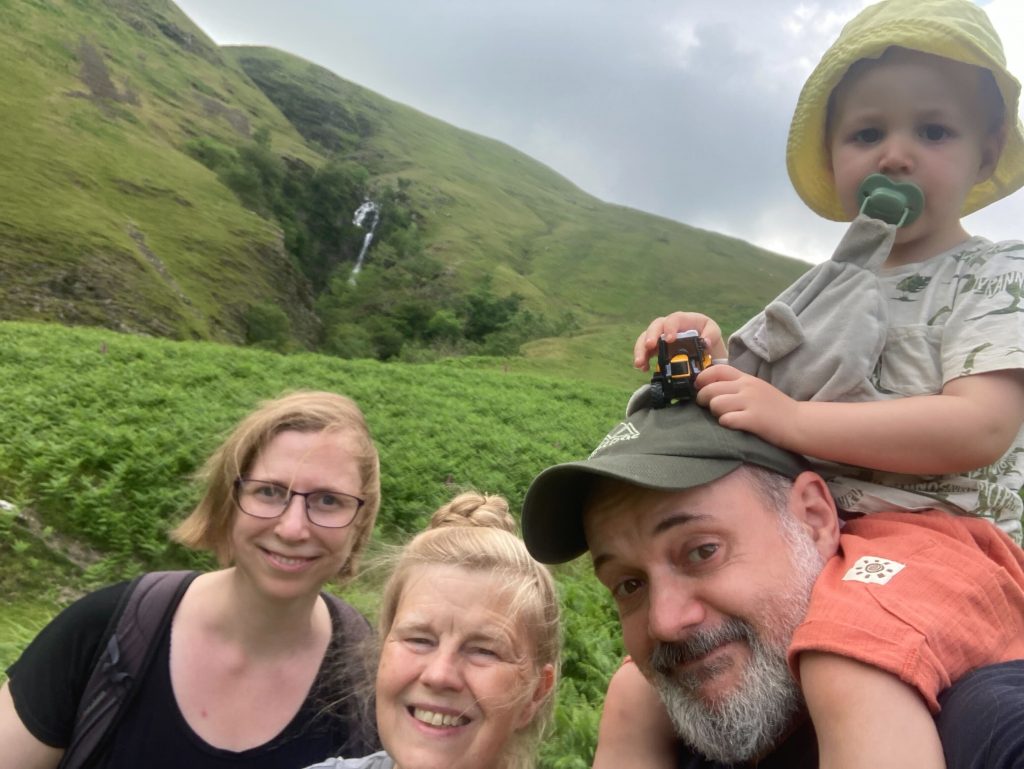
I am delighted to announce that A Traveller in Time: The Critical Practice of Maureen Kincaid Speller has been shortlisted for a Hugo Award in the Best Related Work category.
With news like this comes the accompanying sadness that Maureen herself is not here to share in the excitement and to take her rightful place as nominee. But there is joy too in knowing how pleased she would be – in fact, knowing Maureen, I think the word would be gobsmacked!
I am especially pleased for Maureen’s husband Paul Kincaid, who has been so supportive throughout the process of bringing the book to publication, and for Francesca Barbini of Luna Press, who immediately came on board to give the book a home. I am looking forward to seeing both of them at the Hugo ceremony at the Glasgow Worldcon in August.
Huge congratulations of course to all other Hugo nominees and especially to Iain J. Clark, who so kindly gave permission for his beautiful artwork ‘Path’ to be used as the cover for Maureen’s book. You can find a complete list of Hugo finalists here.
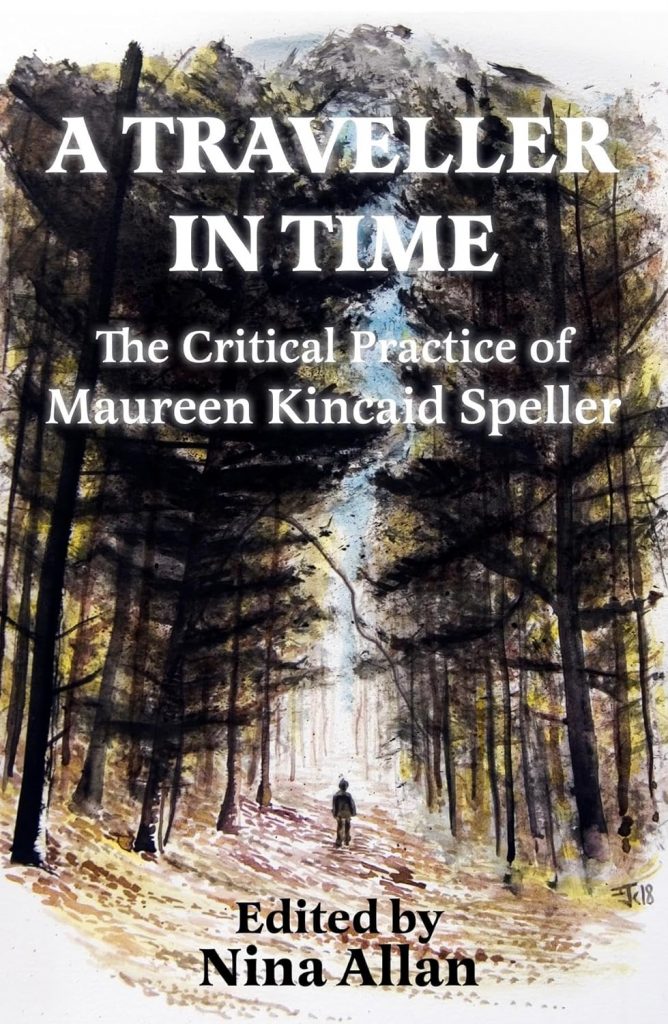
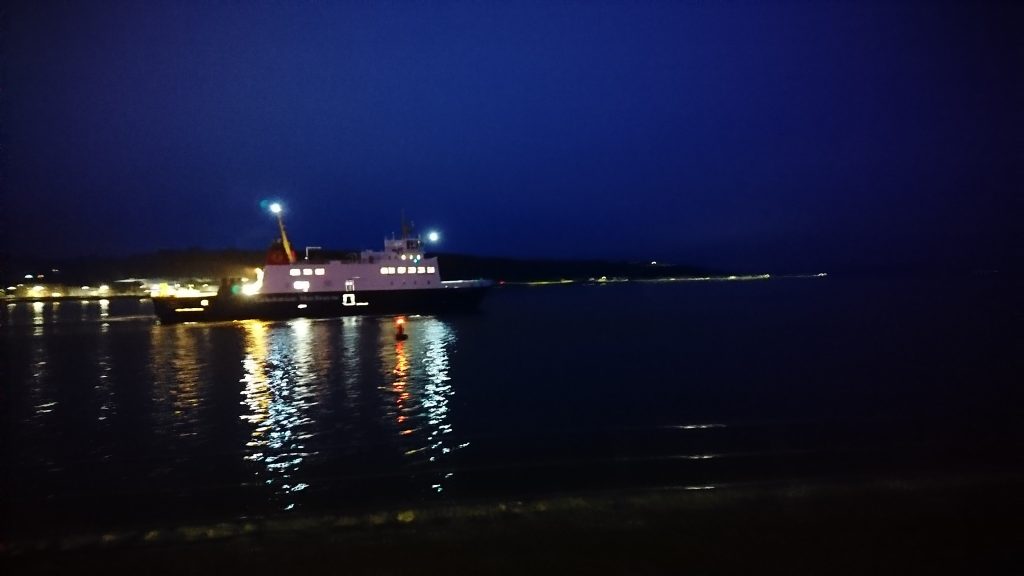
This morning at 7 o’clock, Chris set sail from our island for the final time. I ran down to the quayside to see him off. Playing on my headphones was Fairport Convention’s ‘A Sailor’s Life’, which seemed fitting to mark the beginning of a limitless journey through the Dream Archipelago, and dovetailed well with Sandy Denny’s ‘Like an Old-Fashioned Waltz’, which was played at our wedding. The committal music Chris chose was the second movement of Beethoven’s Symphony No 7 in A Major.
We decided not to have a funeral. Neither of us could bear the thought of it, and the imposition it would have placed on people, to travel up to Scotland in the middle of winter, made the decision easier for us to take.
There will instead be a memorial event for Chris at the Glasgow Worldcon in August, a chance for us to come together and celebrate Chris’s life, work and legacy. Much more our kind of thing.
I am thrilled and a little overwhelmed to announce that the French edition of Conquest (translation, as ever, by the incomparable Bernard Sigaud) is a finalist for the 2023 Prix Medicis. It has also made the second selection for the 2023 Prix Femina for best translated work. You only have to look at my fellow shortlistees to see what an honour this is.
The growing visibility and success of my work in France is in no small part down to the dedication and commitment of my French publishers, Sylvie Martigny and Jean-Hubert Gailliot of Editions Tristram. These are very special people, who live and breathe literature. Their generosity and sensitivity, their belief in what I have done and what I can do is indeed a beacon in dark times.
Bravo, mes amis, bravo. C’est tout pour vous.
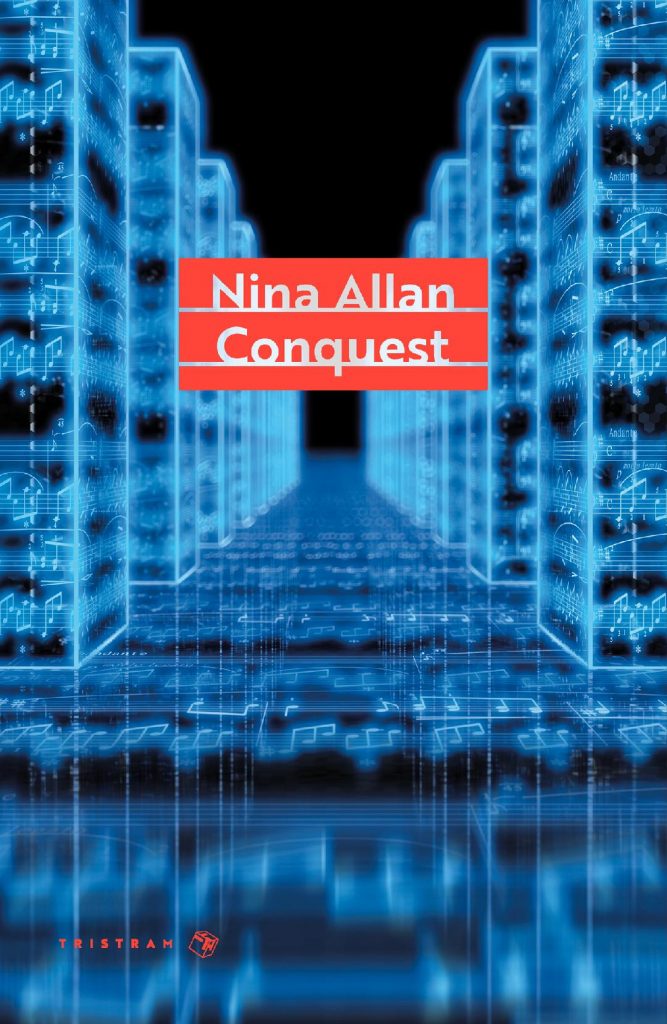
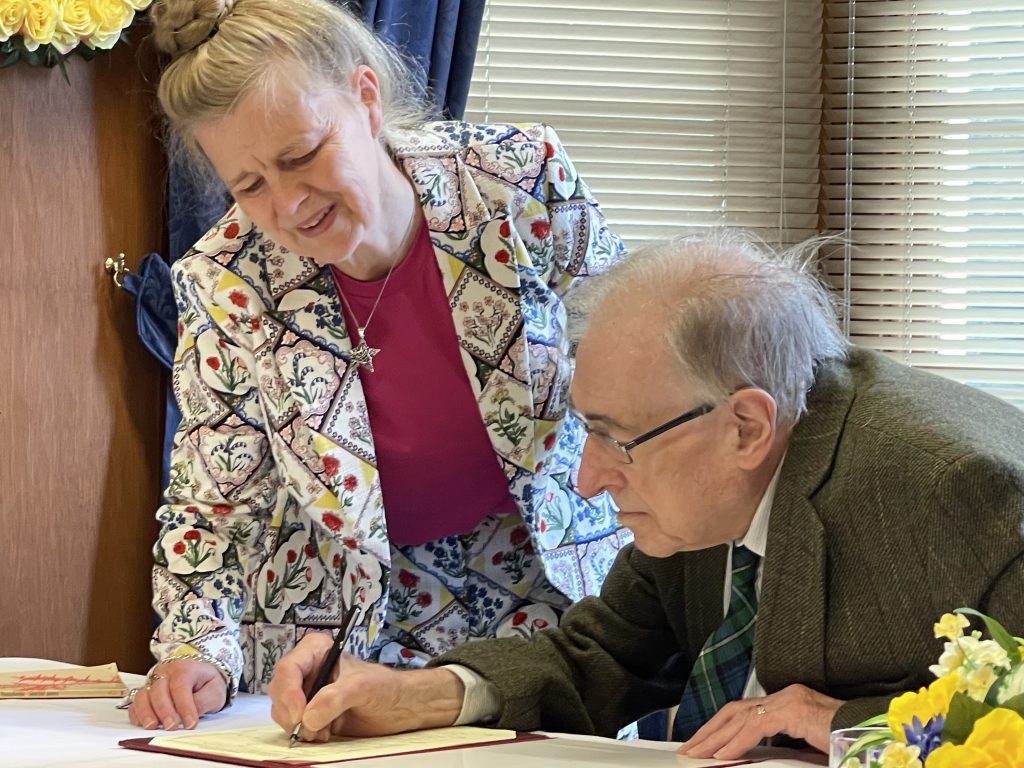
Chris and I were married on Saturday, surrounded by friends and members of both our families. It was a joyful day, marking the end of what has been a summer of difficult news and major life adjustments.
In July, Chris was diagnosed with cancer. He spent six weeks in hospital in all, mainly on account of a broken leg, an injury that came about as a direct result of the disease, though of course we did not know that when it happened.
He is now home, and concentrating his energies on his current writing project. His spirits remain high, his resilience remarkable, his sense of humour undiminished. We are relieved to have regained a passable version of what we think of as normality, and aim to keep things that way for as long as possible. We are doing the work we love, being together, and focusing on the positive.
